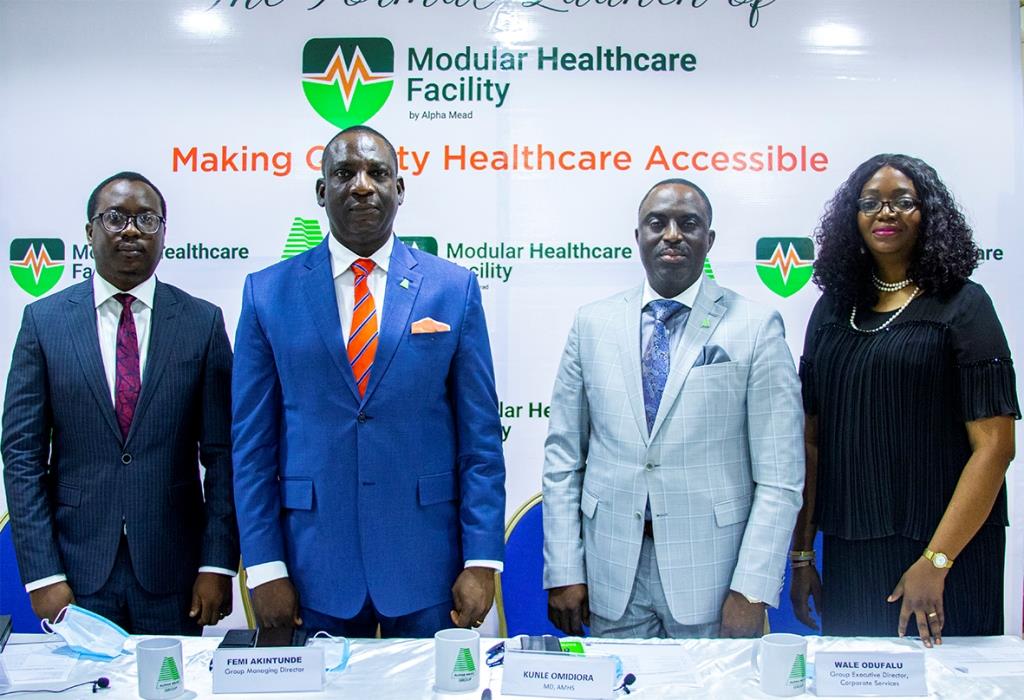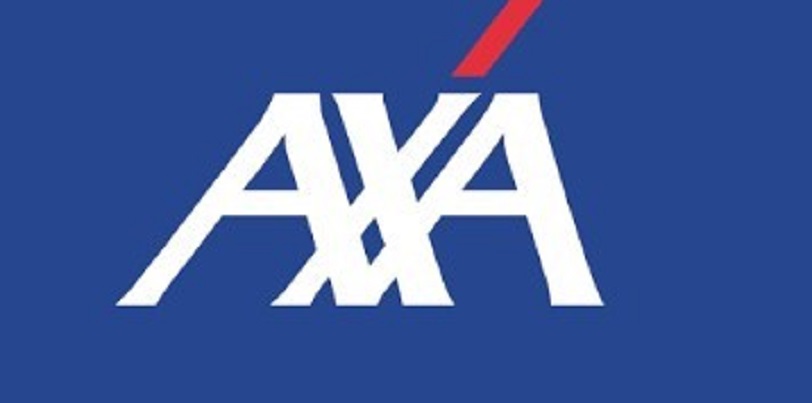Health
Alpha Mead to Launch Modular Healthcare Facility in Lagos

By Modupe Gbadeyanka
A state-of-the-art Modular Healthcare Facility (MHF) will on Wednesday, June 23, 2021, be launched at the Gbagada General Hospital, Gbagada, Lagos.
The facility was put in place by Alpha Mead Healthcare Management Services, a subsidiary of the Alpha Mead Group, to accelerate access to quality healthcare for all Nigerians.
Explaining further, the Group Managing Director of Alpha Mead Group, Mr Femi Akintunde, “The MHF is a customised, mobility-enhanced, prefabricated portacabin with detachable modules equipped with state-of-the-art clinical and diagnostic equipment that is designed to take quality healthcare services to the doorstep of all Nigerians.”
He further disclosed that after a successful pilot of the company’s foray into healthcare at Gbagada General Hospital, and Lagos University Teaching (LUTH), the need to make quality healthcare accessible to more Nigeria became even more pressing.
“So, we went back to the drawing board. We noted that some of the issues slowing down the government and private sector programmes in making healthcare accessible for all are; how long it takes to set up a healthcare facility, inadequate amount of healthcare workers, lack of the required equipment and sometimes; even the terrain or location where these healthcare facilities will be constructed,” Mr Akintunde informed newsmen at a parley on Wednesday, June 16.
“To address these issues, we came up with the Modular Healthcare Facility (MHF). The whole idea of the MHF is to aggressively drive the penetration of healthcare facilities in Nigeria by reducing the construction timeline of a healthcare facility to less than 30 days – saving the time lost to design, construction, equipment installation and commissioning of regular brick and mortar healthcare facilities, which sometimes run into years,” the engineer further said.
He noted that to address the issue of inadequate medical practitioners, particularly doctors in the rural areas or crisis zones, the MHF was designed to leverage technology to connect patients with medical doctors anywhere through its telemedicine facilities.
According to him, the MHF provides the right healthcare equipment that meets the minimum standard for each class of the healthcare segment – primary, secondary and tertiary and reduces the dependency of the healthcare facility on public utility by running on efficient and clean utility systems such as solar power, bio-digester sewage system, etc.
In his presentation, Mr Kunle Omidiora, Managing Director, Alpha Mead Healthcare & Management Services (AMHS), the subsidiary of Alpha Mead promoting the MHF said the product is coming to bridge the widening gap in access to quality healthcare in Nigeria.
“From whatever lens one chooses to view the challenges with the healthcare sector in Nigeria today; whether financial, personnel, equipment, systems or technologies; the biggest challenge with Nigeria’s healthcare sector is that of access to quality healthcare,” he said.
“This challenge is costing our nation a great deal. For example, a USAID report noted that Nigeria shoulders up to 10% of the global disease burden.
“The report noted further that this situation is caused by lack of access to quality healthcare facilities and workers, particularly in the rural areas,” Mr Omidiora stated.
He further noted that the challenge can be further put in context when squared against 2019 data from Nigeria Health Facility Register (NHFR).
“According to the report, Nigeria has 40,345 registered hospitals and clinics to serve the 201 million population. This simply implies that one healthcare facility is responsible for an estimated five million Nigerians”, Mr Omidiora explained.
“The problem is even more compounded with data from WHO report revealing that only a quarter of Nigeria’s primary healthcare facilities have more than 25% of the minimum equipment package. One, therefore, does not need to wonder why Nigeria loses over 1 billion dollars to medical tourism, has one of the world highest infant mortality rates, and why prevalence of medical errors in Nigeria is on the rise”.
He explained that this huge gap is what the MHF intends to bridge; noting that the MHF is equipped with Radiology Information System, Picture Archiving Communication System (RISPACS), Enterprise Electronic Medical Records (EMR) and Telehealth infrastructure for real-time reporting of investigation and remote consultation.
Health
SpecSMART Eye Clinic Takes Affordable, Quality Care to Ikeja, Environs

By Modupe Gbadeyanka
The dream of residents of Ikeja and its environs enjoying affordable and quality care has now become a reality as a result of the opening of a new branch of SpecSMART Eye Clinic in the Opebi area of the capital of Lagos State.
SpecSMART Eye Clinic, a leading provider of optometry services in Lagos, commenced operations in Nigeria’s commercial capital in 2022.
Since then, it has been offering top-notch eye care to residents of the metropolis, especially those living on the Island. It has built a strong reputation for delivering high-quality primary eye care and optical products.
However, to extend its services to Lagosians living on the Mainland, it has now opened a new branch in Ikeja, reinforcing its commitment to providing accessible, affordable eye care to a wider community.
Business Post gathered that the clinic’s state-of-the-art services are supported by a team of skilled optometrists and opticians, utilizing cutting-edge digital equipment.
The new Ikeja location will offer a wide range of services, including Automated Eye Examinations using advanced digital equipment for precise diagnosis and personalized care.
In addition, clients will enjoy on-the-spot lens glazing for single vision, bifocals, and varifocals, with additional lens coatings, with services to be rendered seven days a week from 9 am to 9 pm on Mondays to Saturdays, and on Sundays and public holidays from 10 am 7 pm.
Also, the clinic has over 950 frames, ranging from affordable home brands to premium designer options, priced from N18,000, and has flexible appointment scheduling with 24-hour online booking via SpecSMART’s website.
The facility has partnerships with leading HMO providers in the country and offers glaucoma management and other essential eye health services.
According to the company, its introductory packages start from N30,000 and include consultation, frame, and single-vision lenses.
“With the opening of our Ikeja branch, we are ready to serve more individuals who need accessible, cost-effective, and reliable eye care.
“Our aim is to create a positive impact in Nigeria’s optometry sector by combining advanced technology with a patient-centred approach,” the Practice Head and Medical Director of SpecSMART, Dr Adaeze Nwoko, stated.

Health
FG Begins Vaccination Against Mpox in FCT, Six States

By Adedapo Adesanya
The Federal Ministry of Health and Social Welfare through the National Primary Health Care Development Agency (NPHCDA) has commenced the vaccination against Monkeypox, now known as Mpox.
Business Post reports that Bayelsa, Rivers, Cross River, Akwa Ibom, Enugu, Benue, and the Federal Capital Territory, were selected as pilot states for the vaccination.
An average of 631 persons are expected to be vaccinated across the seven states with two doses of the Mpox vaccine. A buffer for 50 persons will be kept at the national in case of an upsurge in other states.
NPHCDA in a statement posted on its verified X account confirmed the exercise, stressing that the vaccination will help to protect communities and safeguarding health of the people.
In a related development, according to the latest update by the Nigeria Centre for Disease Control (NCDC), there are 1,442 suspected cases of Mpox from 36 states and the Federal Capital Territory, while the number of confirmed cases of the infection was 118 from 28 states and the FCT.
“To prevent the spread of Mpox, we strongly advise the public to avoid contact with animals that may carry the virus, including sick or dead animals in affected areas, avoid handling materials that have been in contact with infected animals, limit unnecessary physical contact with individuals who are infected, practice frequent handwashing with soap and water, and ensure that animal food products are thoroughly cooked before eating.
“It’s also important to use protective clothing and gloves when handling sick animals or their tissues. Similarly, health workers are advised to follow standard safety protocols including droplet precautions when treating patients, use protective equipment including masks, gloves, and gowns, during patient care, and be vigilant for symptoms of Mpox, especially fever and rash, among other measures.”
Health
AXA Mansard Health Partners LUTH in Blood Donation Drive

By Aduragbemi Omiyale
Over 250 pints of blood have been donated by AXA Mansard Health to the Lagos University Teaching Hospital (LUTH), Idi Araba.
The blood was donated by more than 100 employees of the leading health insurance company in Nigeria through its volunteering programme tagged AXA Hearts in Action.
The initiative is part of the company’s blood donation drive aimed at contributing to positive societal and environmental impacts through employee volunteering, and expertise related financial support and in-kind donations.
According to the Chief Client Officer of AXA Mansard, Ms Rashidat Adebisi, “Through the AHIA, our employees do not just give time to great causes; we work together for a better future.”
“We share our time, knowledge and expertise as a people with a shared purpose of acting for human progress by protecting what matters through initiatives like this,” she added.
Ms Adebisi said the blood drive is a shining example of the philosophy in action, where collective contributions serve as a reminder that true impact often involves giving more than just money. It’s about putting one’s heart in action – an idea embedded in AXA’s corporate culture.
On his part, the chief executive of AXA Mansard Health Limited, Mr Tope Adeniyi, said with hospitals frequently experiencing blood shortages, events like these serve as a lifeline for patients in need.
“We are proud to contribute to the local healthcare sector and provide much-needed support to hospitals such as LUTH, ensuring that they have resources essential to saving lives,” he added.
Also commenting, the Head of Corporate Services and Public Relations at LUTH, Omolola Olubukunola Fakeye, thanked the firm for the “generous support,” which has made a “meaningful difference to our blood bank and ultimately to the lives of patients.”
“Blood donations are invaluable in many critical treatments, and initiatives like AXA Mansard’s blood drive bring immense relief to healthcare system.
“We are sincerely grateful for this partnership and the dedication of AXA Mansard’s employees,” Fakeye stated.
AXA Hearts in Action operates globally, she urging AXA employees everywhere to engage with and give back to their communities.
Through diverse projects – from health initiatives like this blood drive and medical outreaches to environmental efforts like the AXA Week for Good “Trash-to-Treasure” waste management project – AXA staff have opportunities to make a lasting difference on issues that matter.
For AXA Mansard, every act of social service brings them closer to the communities they serve, helping build a world where giving back is not only about charity but about lasting, positive change.
-

 Feature/OPED5 years ago
Feature/OPED5 years agoDavos was Different this year
-
Travel/Tourism8 years ago
Lagos Seals Western Lodge Hotel In Ikorodu
-

 Showbiz2 years ago
Showbiz2 years agoEstranged Lover Releases Videos of Empress Njamah Bathing
-

 Banking6 years ago
Banking6 years agoSort Codes of GTBank Branches in Nigeria
-

 Economy2 years ago
Economy2 years agoSubsidy Removal: CNG at N130 Per Litre Cheaper Than Petrol—IPMAN
-

 Banking2 years ago
Banking2 years agoFirst Bank Announces Planned Downtime
-

 Sports2 years ago
Sports2 years agoHighest Paid Nigerian Footballer – How Much Do Nigerian Footballers Earn
-

 Technology4 years ago
Technology4 years agoHow To Link Your MTN, Airtel, Glo, 9mobile Lines to NIN












1 Comment